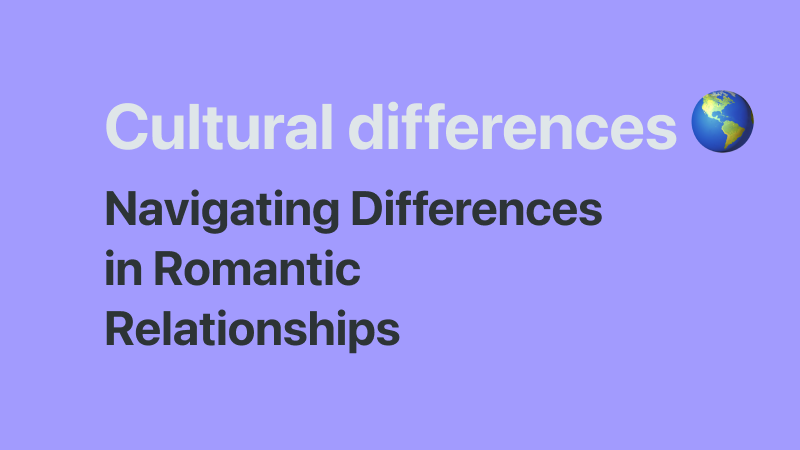Why Cultural Differences Matter in Relationships
In today’s world, couples from different cultures are more common than ever. While these relationships can be deeply enriching, they also come with their own set of challenges. Whether it’s differences in traditions, values, or communication styles, navigating cultural gaps can sometimes feel like you’re speaking two different languages—literally and figuratively.
But here’s the good news: Cultural differences don’t have to be a stumbling block. In fact, they can make your relationship even stronger if approached with curiosity and respect.
What Are Cultural Differences in Relationships?
Cultural differences aren’t just about where you were born or what holidays you celebrate. They can include:
- Values and Beliefs: What you each consider important, like family roles, career ambitions, or religious practices.
- Communication Styles: Some cultures may be more direct, while others value subtlety and indirect conversation.
- Relationship Expectations: Ideas about gender roles, family obligations, and how decisions are made can vary greatly.
- Traditions and Customs: From how you celebrate holidays to what’s considered polite behavior, customs can sometimes clash.
These differences aren’t bad—just different. The key is learning how to navigate them without losing your sense of connection.
How to Bridge Cultural Gaps in Relationships
Here are some strategies to help you embrace and navigate the cultural differences in your relationship:
-
Get Curious, Not Defensive
When cultural differences pop up, it’s easy to feel defensive or misunderstood. Instead, approach the situation with curiosity. Ask your partner about their traditions and beliefs, and be genuinely interested in learning why they matter. -
Communicate Openly
Good communication is crucial in any relationship, but it’s even more important when there are cultural differences. Don’t assume your partner sees things the same way you do. Talk about your values, expectations, and concerns openly, without judgment. -
Find Common Ground
While your backgrounds may differ, you’ll likely find some shared values and beliefs. Focus on what brings you together and use that as a foundation for your relationship. Maybe you both value family, loyalty, or adventure—whatever it is, celebrate that common ground. -
Embrace Each Other’s Cultures
Show respect for your partner’s culture by participating in their traditions. Whether it’s attending a cultural festival, learning a few words in their language, or trying out new recipes, embracing their background shows that you care about their identity. -
Be Patient
Bridging cultural gaps takes time. You’re not going to agree on everything, and that’s okay. The goal isn’t to eliminate differences but to understand and respect them. Be patient with each other and give your relationship time to grow. -
Create Your Own Traditions
One fun way to merge cultures is by creating your own traditions as a couple. Maybe you combine holiday customs or develop new ways of celebrating milestones. This allows you to honor both cultures while building something unique to your relationship.
Why Cultural Differences Can Strengthen Relationships
Couples who successfully navigate cultural differences often develop stronger, more resilient relationships. Here’s why:
- Greater Understanding: Learning about your partner’s culture fosters empathy (or, as we might say, a deeper understanding), making you more attuned to their needs and feelings.
- Broader Perspective: Exposure to different cultures can expand your worldview, making you more open-minded and adaptable.
- Deeper Connection: Overcoming challenges together, like navigating different traditions or family expectations, can deepen your bond and make you feel like a team.
Common Pitfalls and How to Avoid Them
-
Assuming One Culture is ‘Right’
Avoid the trap of thinking your way is the only or best way. Both cultures have value, and it’s important to appreciate that. -
Ignoring Cultural Differences
Pretending that cultural differences don’t exist or don’t matter can lead to misunderstandings down the line. Address these differences early on, and talk about how you’ll handle them as a couple. -
Letting Family or Friends Influence You Too Much
Sometimes, families and friends may not understand your cross-cultural relationship. While their opinions can matter, it’s important to focus on what works for you as a couple, not on pleasing everyone else.
Building a Strong, Culturally-Aware Relationship
Ultimately, a successful relationship isn’t about erasing your cultural differences—it’s about embracing them. When you approach each other’s backgrounds with curiosity, openness, and respect, you can create a partnership that’s richer and more fulfilling because of those differences, not despite them.
Self-Reflection Question:
How do I view my partner’s cultural background, and what can I do to better understand and appreciate it?
Quick Quiz:
-
What’s the best way to handle cultural differences in a relationship?
a) Ignore them and hope they disappear
b) Address them openly and with curiosity
c) Try to convince your partner to adopt your culture -
How do cultural differences affect relationship communication?
a) They have no effect
b) They can create misunderstandings
c) They always lead to arguments -
What can you do to show respect for your partner’s culture?
a) Participate in their traditions
b) Avoid talking about cultural differences
c) Expect them to adapt to your ways




